
by Ria Olivier | Mar 8, 2022 | Engineering, Genomics, International Days, News, Oceanography, Research, SA Agulhas II, Southern Ocean, STEM, sub-Antarctic, Women in Science
The theme for this year’s International Women’s Day is “Break the Bias”.
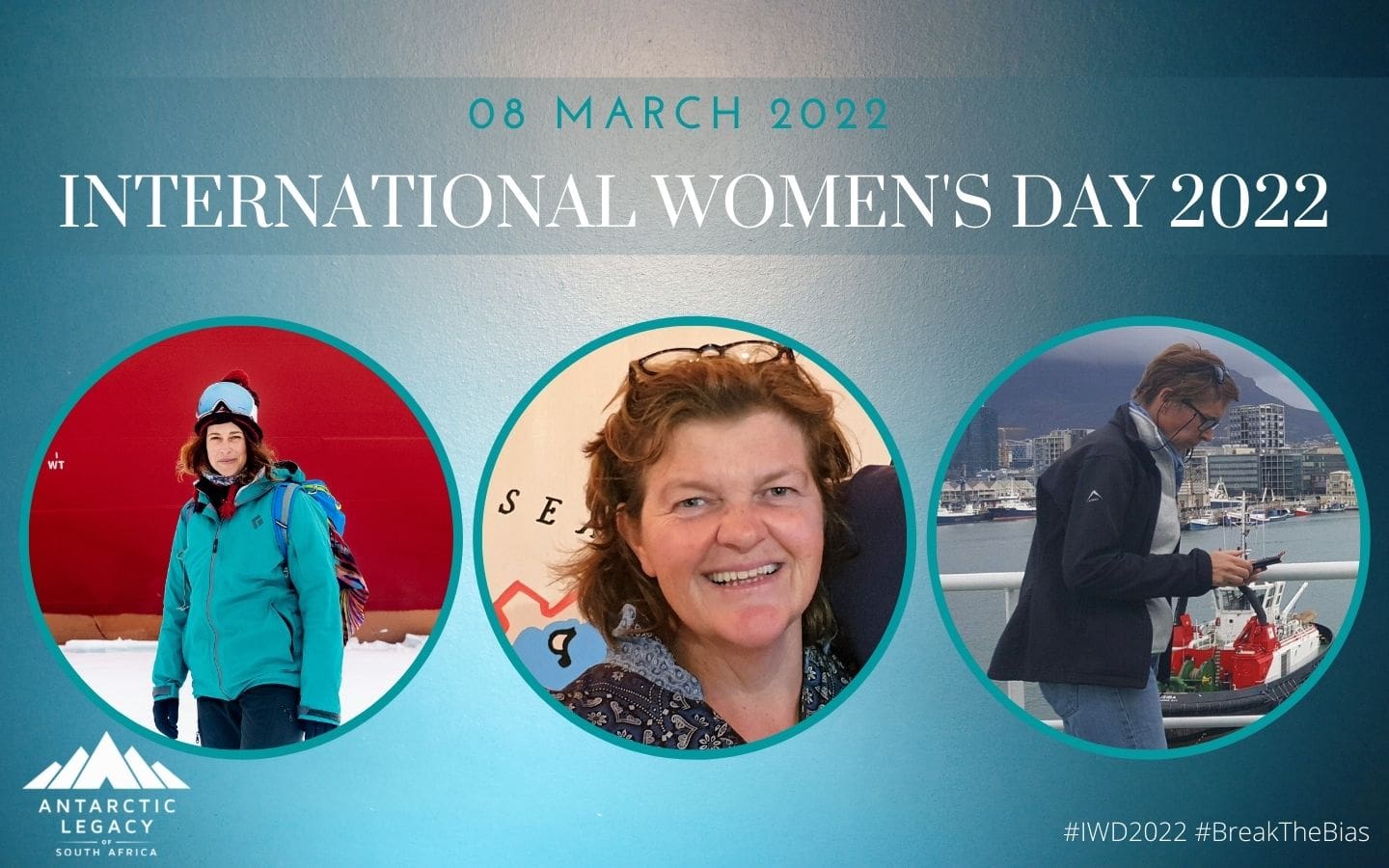
This year we are featuring three inspiring women within the South African National Antarctic Programme. They are leaders in their fields and represent South Africa on an international level.
 Prof Annie Bekker – Stellenbosch University
Prof Annie Bekker – Stellenbosch University
Professor in Engineering, Director of the Sound & Vibration Research Group, and currently on the international Endurance 22 expedition (Antarctica).
“My job is about applying maths and science to technology… discovering and searching for new things. It is sometimes difficult, it takes long hours, breakthroughs can be incremental… and many times the belief, momentum, and enthusiasm for success have to come from within myself… Today, I love my job and the hard work to this point is absolutely worth it. I could not get here without encouragement, love, and mentorship in key moments. I cannot continue without the support of my family, the example of my colleagues, or the curiosity of my students – their excellence and hunger for their own new frontiers of discovery.
This is your life. Invest in your education. Believe in yourself, try, try again, never give up. Be hungry to learn. Sharpen your skills. Absorb all that is positive around you. Find mentors. Accept responsibility. Rebound from failure. Celebrate success. Be brave. Dream”.
Check out the Sound & Vibraton Research Group website: svrg.sun.ac.za.
Read more about Annie’s work and adventures here.
 Prof Isabelle Ansorge – University of Cape Town
Prof Isabelle Ansorge – University of Cape Town
Head of the Oceanography Department at UCT and mastermind behind South Africa’s first class afloat – SEAmester.
Isabelle Ansorge is an observational oceanographer, Professor, and first female Head of the Oceanography Department at the University of Cape Town. Having built an observational oceanography career both nationally and internationally, Prof. Ansorge’s interests lie in Indian, Atlantic, and Southern Ocean dynamics that include Southern Ocean eddy transports of heat and salt, frontal dynamics, and variability in the Antarctic Circumpolar Current and its effects on Subantarctic Islands such as Marion Island. Another passion of Isabelle’s is the shipboard training of postgraduate students from all over South Africa and she is the mastermind behind the SEAmester Floating University programme. SEAmester provides an incredible teaching and research platform for South African early-career scientists and lecturers alike. Prof. Ansorge’s list of affiliations is a testament to her extensive experience in the field including being a committee member of the Scientific Committee on Antarctic Research (SCAR), as a member of the start-up committee for the Southern Ocean Observing System (SOOS), as an Executive Bureau Member of the International Union for Geodesy and Geophysics (IUGG) and formally the vice-president of the International Association for Physical Sciences of the Oceans (IAPSO).
Check out the SEAmester website: seamester.co.za.
Read more about Isabelle here.
 Prof Bettine van Vuuren – University of Johannesburg
Prof Bettine van Vuuren – University of Johannesburg
Professor of Zoology, Director of the Centre for Ecological Genomics and Wildlife Conservation, and Chair of the South African Committee for the Scientific Committee on Antarctic Research (SANC for SCAR).
“The first thing to say is that I believe there is nothing that any person can’t do if they apply their mind (and time) to it. We often set our own ceilings based on general beliefs that society or others impose on us, and it is crucial that we break through these (non-real) boundaries. STEM fields are a case in hand. This is especially true for women, who traditionally were seen as homemakers or child-carers. In STEM specifically, fields such as mathematics, physics, and engineering, and traditionally more field-based disciplines such as zoology, botany, or oceanography, are seen as more suited to men (either because women were not traditionally considered as analytically strong, capable to work in the field, or for that matter, be away from home for any period of time). It is critical that any person (both men and women) should carefully consider what they enjoy, what their specific strengths are (be that a STEM career for a woman, or as a childcarer/homemaker for a man), and then pursue that with all their strength and passion. Personally, I was initially directed into a field that I had no interest in (because I could not answer questions asked re where I would work if my husband lived in a small town), and from a personal perspective I strongly urge and support women that want to step out of the usual/ typical / what is expected from you by society and follow what they are passionate about”.
Follow Bettine on Twitter (Click here).
You can also visit her website: molzoolab.co.za.
Meet the SANC for SCAR committee here.
Read more about Bettine here.
Image of Prof Bekker supplied by: James-John Matthee.
Anche Louw, Antarctic Legacy of South Africa, 08 March 2022

by Ria Olivier | Feb 16, 2022 | Current Event, Meteorology, News, Oceanography, Research, SA Agulhas II, Science
The South African Weather Service (SAWS) has two Marine Scientists (Marc De Vos and Carla Ramjukadh) onboard the S.A. Agulhas II, during the Endurance 22 Expedition. They are responsible for weather forecasts and meteorological data requirements from the various groups onboard the vessel.
“The SA Agulhas II vessel is able to accurately measure atmospheric parameters throughout the Endurance22 expedition. These measurements are supplemented with visual observations (such as weather, clouds, and sea-ice) done manually by the onboard meteorologist, giving a more complete picture of current weather conditions.” (www.endurance 22.org)
Read more about the responsibilities of SAWS onboard this cruise – Click here.
Also, check out the video below – Interview with Marc De Vos and Carla Ramjukadh. These live interviews give an insight into what is currently happening onboard the vessel. Schools all over the world are able to register and take part in live interaction with the various science and other groups onboard. Read more here.
The SAWS team will also contribute to the ARGO research programme, which involves collecting and sharing data from inside the ocean by deploying technologically advanced buoys.
For more information on the role of SAWS (and the various instruments that are used during this cruise) and how schools in South Africa are impacted and involved in scientific cruises, check out the video below: Interview with Dr. Tamaryn Morris, a physical oceanographer and Senior Manager for Marine (South African Weather Service), and Thomas Mtontsi, the Science Engagement Officer at the South African Environmental Observation Network (SAEON).
Anche Louw, Antarctic Legacy of South Africa, 16 February 2022

by Ria Olivier | Feb 11, 2022 | Marion Island, Meteorology, Not-Assigned, Oceanography, Research, SA Agulhas II, SANAP Student, Science, Southern Ocean, STEM, sub-Antarctic, Women in Science
In honour of every woman and girl entering the field of science within the Antarctic, sub-Antarctic and Southern Ocean.
Be inspired by the Women in Antarctic, sub-Antarctic and Southern Ocean Science.
Be inspired by the girls taking Marine Sciences as a subject in high school laying the path for their future in science.
Read more about the new SA subject – Marine Sciences: https://bit.ly/3gF9WN7
Anche Louw, Antarctic Legacy of South Africa, 11 February 2022

by Ria Olivier | Dec 22, 2021 | Legacy, News, Oceanography, Research, SA Agulhas II, Science, Southern Ocean
Congratulations to all SANAP graduates of 2021. A special congratulations to Dr Mhlangabezi Mdutyana, who just made history by being the first black South African to graduate with a doctorate in observational ocean biogeochemistry.
He is part of the Parallel cycling of nitrogen and iron in the upper Southern Ocean: implications for biological CO2 drawdown and global ocean fertility project led by Principal Investigator, Dr Sarah Fawcett (Department of Oceanography, University of Cape Town).
Read Dr Mdutyana’s inspirational story here. Dr Mdutyana was interviewed by various news channels, see below. Dr Mdutyana is a true inspiration to the future generation of scientists in South Africa.
Anche Louw, Antarctic Legacy of South Africa, 22 December 2021.

by Ria Olivier | Jun 25, 2021 | International Days, Oceanography, Research, SA Agulhas II, Uncategorised

On the 25th June, we celebrate International Day of the Seafarer and recognise the invaluable contribution seafarers make to world trade and the global economy.



The Day of the Seafarer was established in 2010 by a resolution adopted in Manila during a diplomatic conference and has since been driven by the International Maritime Organization (IMO). This year is the 11th anniversary of the Day of the Seafarer and the IMO has outlined the following theme: “Seafarers: at the core of shipping’s future”. The theme “seeks to increase the visibility of seafarers by drawing attention to the invaluable role they play now and will continue to play in the future.”


This day allows for the recognition of the unique and vital roles seafarers play in the global community and the United Nations recognise this as an observance day. The Day of the Seafarer encourages the public and ignites official conversations about seafarers and the need to uphold their well-being, ensure a safe working environment and pay tribute to the great sacrifices made within this industry.


The Antarctic Legacy of South Africa (ALSA) wishes to extend our thanks to the African Marine Solutions: AMSOL seafarers that have served aboard the SA Agulhas I and II over the years. The SA Agulhas II has played host to many Overwintering teams, ushered to the Sub-Antarctic Islands and “home” to SANAP scientists and students for research expeditions. Captains, officers, engineers, deck crew and stewards all play an essential role in the success of a research cruise. Working round the clock to ensure the smooth execution of scientific operations, ensuring a safe working environment and navigating through some of the world’s most treacherous seas.


This is an industry which requires great sacrifice and time away from home, however the AMSOL personnel have a level of professionalism which makes working on board efficient and turns the vessel into a “home away from home” for many scientists.
 A great sense of pride and honour is instilled in all who sail aboard the SA Agulhas II and is seen as privilege to be part of this legacy of exploration. We thank all administrative staff involved with ensuring safe and efficient operations and celebrate all seafarers, without whom our scientific endeavours in the Southern Ocean would not be possible.
A great sense of pride and honour is instilled in all who sail aboard the SA Agulhas II and is seen as privilege to be part of this legacy of exploration. We thank all administrative staff involved with ensuring safe and efficient operations and celebrate all seafarers, without whom our scientific endeavours in the Southern Ocean would not be possible.



Tahlia Henry, Antarctic Legacy of South Africa, 25 June 2021

by Ria Olivier | Jun 8, 2021 | International Days, Oceanography, Research, SA Agulhas II, Science, Southern Ocean

United Nations World Oceans Day, is celebrated every year on the 8th June and this day serves as a reminder of the major role oceans have in our everyday lives. The oceans cover over 70% of the planet and is thus an essential source of life, supports and sustains humanity. The ocean also produces at least 50% of the planet’s oxygen supply and supports most of the earth’s biodiversity and a source of protein for billions of people around the globe. A further key component of the ocean is that it supports a global economy with an estimated 40 million people who rely on this ocean-based industry.
 The theme for this year’s United Nations World Oceans Day is “Life and Livelihood”. This theme is also in line with the declaration of intentions that launched a decade of challenges to reach the Sustainable Development Goal 14, “Conserve and sustainably use the oceans, seas and marine resources”, by 2030. This highlights the need to conserve our marine resources for future generations. The main aim of this day is too educate and inform the public of the impact human activities (anthropogenic influence) have on the ocean and to develop a worldwide network of united citizens working together for a sustainable future.
The theme for this year’s United Nations World Oceans Day is “Life and Livelihood”. This theme is also in line with the declaration of intentions that launched a decade of challenges to reach the Sustainable Development Goal 14, “Conserve and sustainably use the oceans, seas and marine resources”, by 2030. This highlights the need to conserve our marine resources for future generations. The main aim of this day is too educate and inform the public of the impact human activities (anthropogenic influence) have on the ocean and to develop a worldwide network of united citizens working together for a sustainable future.
“Life and Livelihood” is a particularly relevant theme this year, in the lead-up to the UN Decade of Ocean Science for Sustainable Development (2021 – 2030). The hope is that this Decade will strengthen international cooperation in developing innovative technologies and promote scientific research which links ocean science with the  needs of society. The South African ocean science community has played a key role in continuous scientific research within the Southern Ocean and Coastal regions of South Africa. This research is conducted at the South African Sub-Antarctic bases namely, Marion Island and Gough Island and during research
needs of society. The South African ocean science community has played a key role in continuous scientific research within the Southern Ocean and Coastal regions of South Africa. This research is conducted at the South African Sub-Antarctic bases namely, Marion Island and Gough Island and during research expeditions aboard the S.A. Agulhas II in the Antarctic region by various institutions. SANAP principal investigators, researchers and students took part in the All Atlantic 2021 Conference (2nd – 4th June 2021) and presented on the need for sustainable development and capacity building for future generations, through innovative programs and a network of Floating Universities such as SEAmester South Africas Class Afloat. Thus highlighting the need to “Connect, Act and Cooperate” within a global network to achieve sustainably with ocean based resources, preserved marine environment and pave the way for future generations.
expeditions aboard the S.A. Agulhas II in the Antarctic region by various institutions. SANAP principal investigators, researchers and students took part in the All Atlantic 2021 Conference (2nd – 4th June 2021) and presented on the need for sustainable development and capacity building for future generations, through innovative programs and a network of Floating Universities such as SEAmester South Africas Class Afloat. Thus highlighting the need to “Connect, Act and Cooperate” within a global network to achieve sustainably with ocean based resources, preserved marine environment and pave the way for future generations.


 Members of the Southern Ocean community set up a Task Force to develop the Southern Ocean Action Plan. This Action Plan will provide a framework for Southern Ocean stakeholders to formulate and develop concrete activities that support the Decade vision. To ensure this Action Plan represents the diverse perspectives and priorities of a wide range of Southern Ocean stakeholders, the Southern Ocean Task Force is now inviting all interested stakeholders to get involved in the process.
Members of the Southern Ocean community set up a Task Force to develop the Southern Ocean Action Plan. This Action Plan will provide a framework for Southern Ocean stakeholders to formulate and develop concrete activities that support the Decade vision. To ensure this Action Plan represents the diverse perspectives and priorities of a wide range of Southern Ocean stakeholders, the Southern Ocean Task Force is now inviting all interested stakeholders to get involved in the process.


 Whether you are an early career professional or have an extensive background in polar activities, or you represent an institute, programme or initiative, your insights into how Southern Ocean science should evolve over the coming years to achieve the UN Sustainable Development Goals will provide valuable information to develop an inclusive Action Plan. If you wish to help us identify Southern Ocean priorities, we kindly ask that you read our report and complete our survey no later than 23:59 UTC on 18 June 2021. – The SOdecade Team
Whether you are an early career professional or have an extensive background in polar activities, or you represent an institute, programme or initiative, your insights into how Southern Ocean science should evolve over the coming years to achieve the UN Sustainable Development Goals will provide valuable information to develop an inclusive Action Plan. If you wish to help us identify Southern Ocean priorities, we kindly ask that you read our report and complete our survey no later than 23:59 UTC on 18 June 2021. – The SOdecade Team
(Images : ALSA archive)


 Prof Annie Bekker – Stellenbosch University
Prof Annie Bekker – Stellenbosch University Prof Isabelle Ansorge – University of Cape Town
Prof Isabelle Ansorge – University of Cape Town Prof Bettine van Vuuren – University of Johannesburg
Prof Bettine van Vuuren – University of Johannesburg
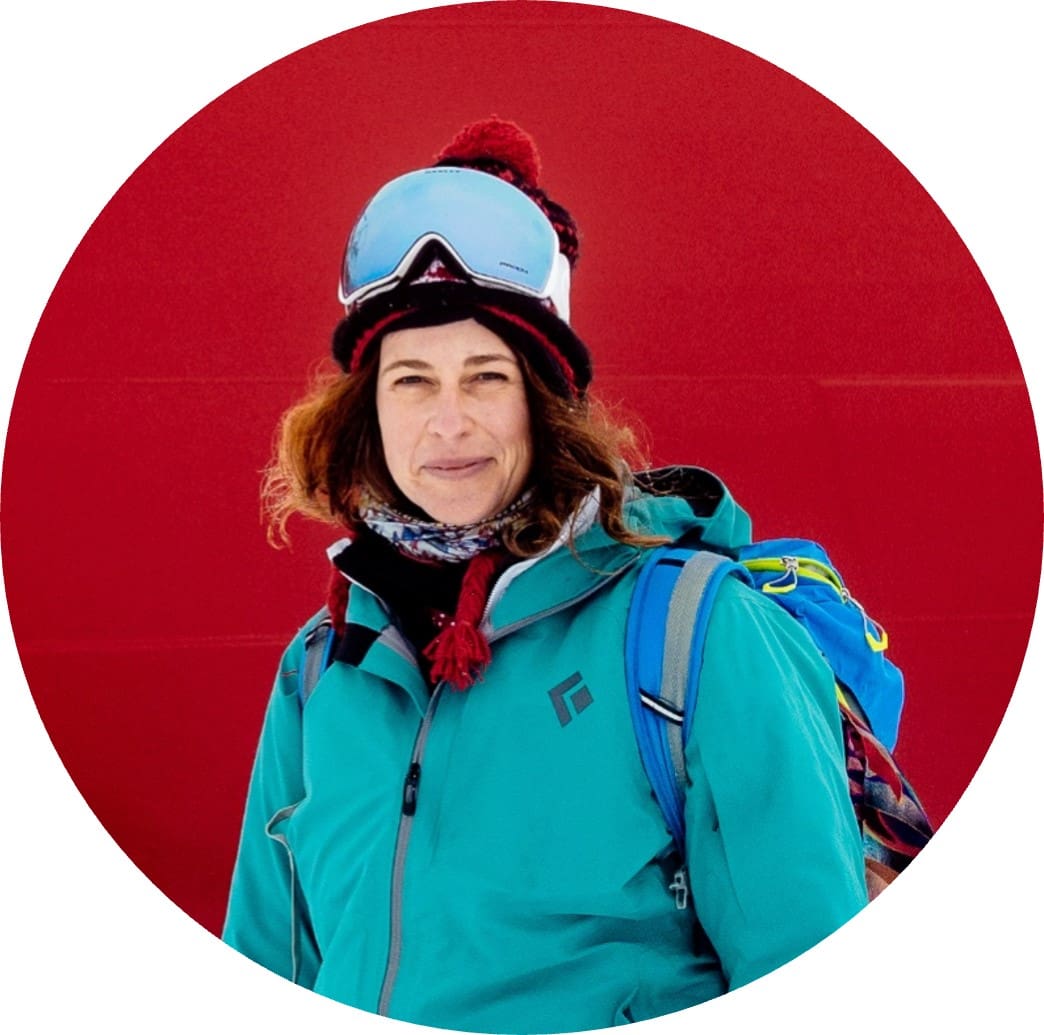 Prof Annie Bekker – Stellenbosch University
Prof Annie Bekker – Stellenbosch University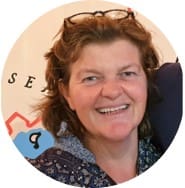 Prof Isabelle Ansorge – University of Cape Town
Prof Isabelle Ansorge – University of Cape Town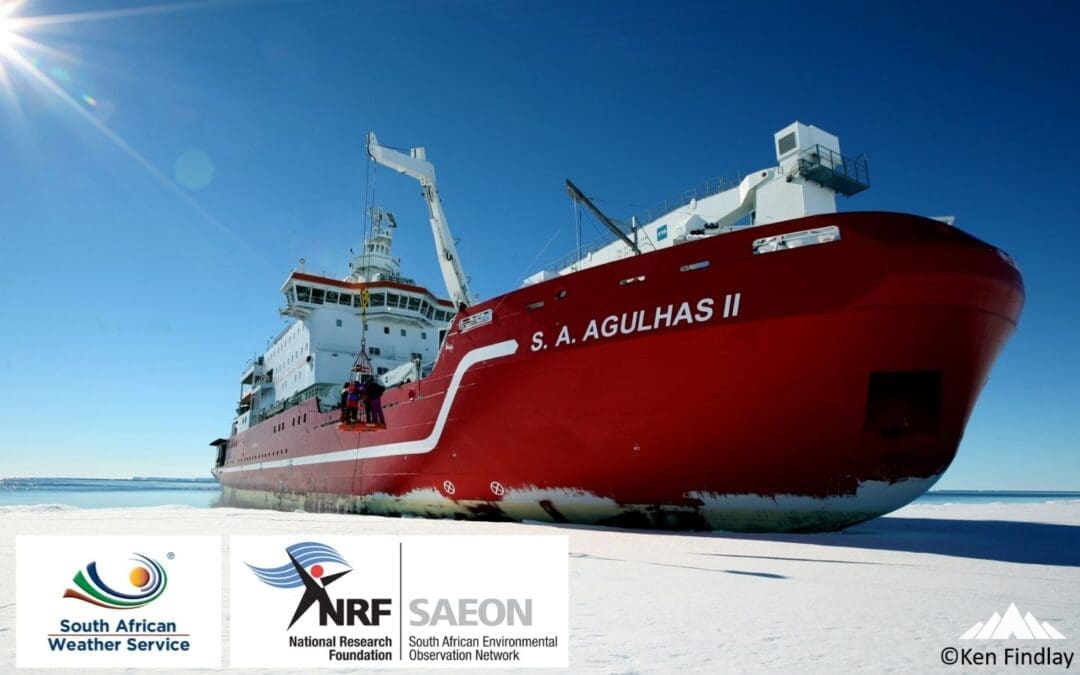
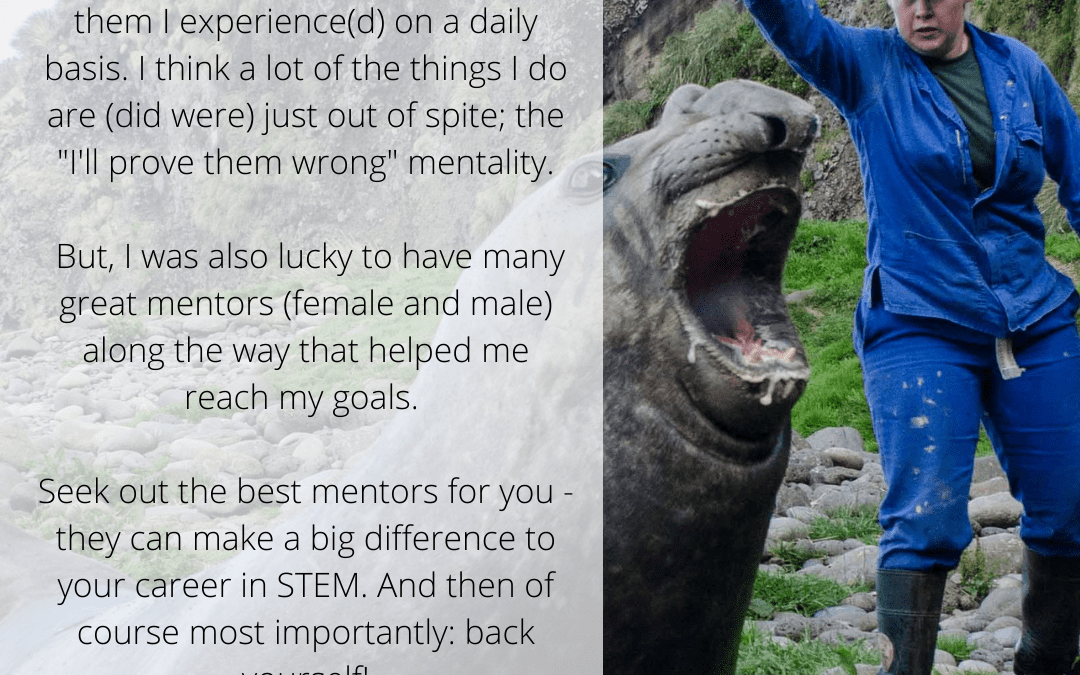
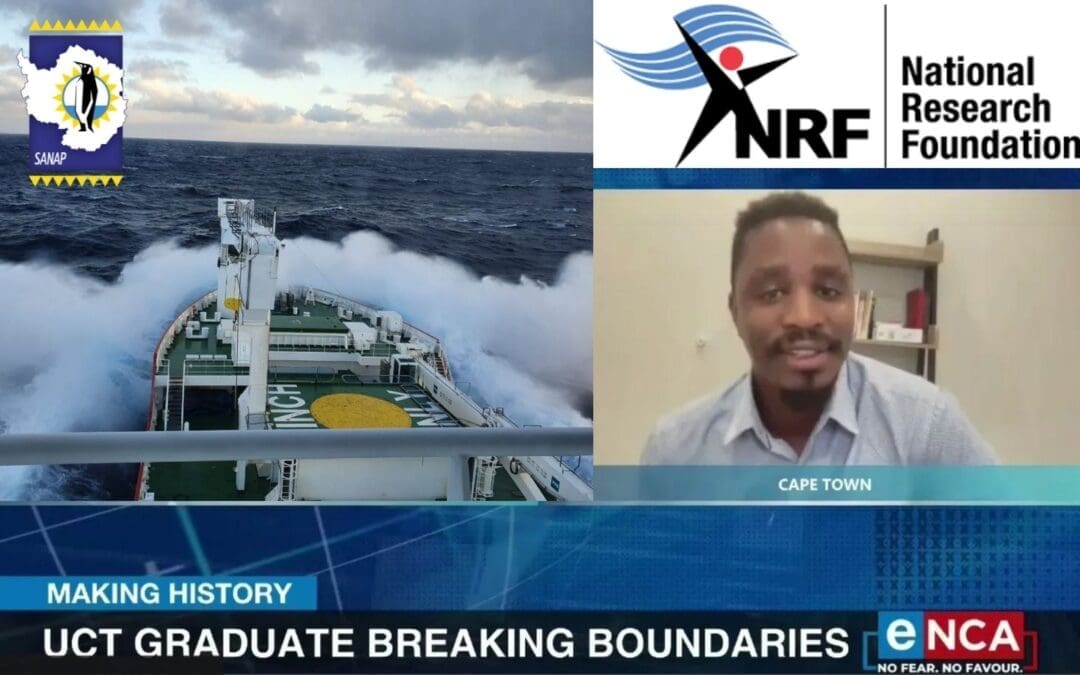











 A great sense of pride and honour is instilled in all who sail aboard the SA Agulhas II and is seen as privilege to be part of this legacy of exploration. We thank all administrative staff involved with ensuring safe and efficient operations and celebrate all seafarers, without whom our scientific endeavours in the Southern Ocean would not be possible.
A great sense of pride and honour is instilled in all who sail aboard the SA Agulhas II and is seen as privilege to be part of this legacy of exploration. We thank all administrative staff involved with ensuring safe and efficient operations and celebrate all seafarers, without whom our scientific endeavours in the Southern Ocean would not be possible.




 The theme for this year’s United Nations World Oceans Day is “Life and Livelihood”. This theme is also in line with the declaration of intentions that launched a decade of challenges to reach the
The theme for this year’s United Nations World Oceans Day is “Life and Livelihood”. This theme is also in line with the declaration of intentions that launched a decade of challenges to reach the  needs of society. The South African ocean science community has played a key role in continuous scientific research within the Southern Ocean and Coastal regions of South Africa. This research is conducted at the South African Sub-Antarctic bases namely,
needs of society. The South African ocean science community has played a key role in continuous scientific research within the Southern Ocean and Coastal regions of South Africa. This research is conducted at the South African Sub-Antarctic bases namely, 

 Members of the Southern Ocean community set up a
Members of the Southern Ocean community set up a 

 Whether you are an early career professional or have an extensive background in polar activities, or you represent an institute, programme or initiative, your insights into how Southern Ocean science should evolve over the coming years to achieve the UN Sustainable Development Goals will provide valuable information to develop an inclusive Action Plan. If you wish to help us identify Southern Ocean priorities, we kindly ask that you read our
Whether you are an early career professional or have an extensive background in polar activities, or you represent an institute, programme or initiative, your insights into how Southern Ocean science should evolve over the coming years to achieve the UN Sustainable Development Goals will provide valuable information to develop an inclusive Action Plan. If you wish to help us identify Southern Ocean priorities, we kindly ask that you read our 




